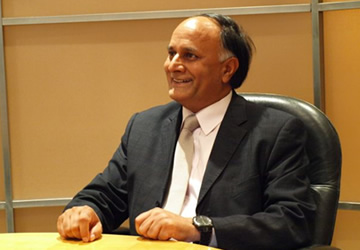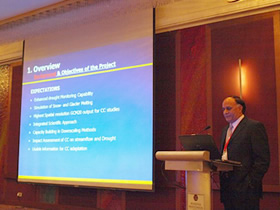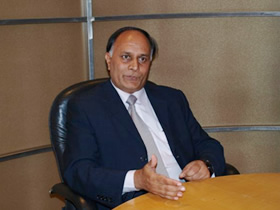Interview with Dr. Ghulam Rasul, Chief Meteorologist, Pakistan Meteorological Department, December 2011, APRSAF-18 in Singapore
Dr. Ghulam Rasul is the Chief Meteorologist from the Pakistan Meteorological Department and is responsible for a SAFE prototyping project, one of the APRSAF initiatives, "Monitoring Water Cycle Variations and Assessing the Climate Change Impact on them in Pakistan." He talks about the project and the SAFE scheme, as well as the merits of APRSAF.
Q: Your SAFE prototyping project is now in progress. What brought you to apply for the project?

Q: When did you apply to the SAFE project?
A: We applied in 2009 and our proposal was approved in 2010. If you look at the prototyping, it is not isolated: it is about water cycle variability. It starts from global warming, and then goes on to the melting of ice and snow from the glaciers. Meltwater runs to the streams; sometimes, the water is sufficient and sometimes it is too much. And when it is too much, flooding prevails. When it is less, drought prevails. So, we are studying all these parameters together in combination with satellite data on soil moisture, rainfall and temperature, etc.
Q: Your project is now in the second year. How is your project going so far?

Dr. Rasul during his presentation at APRSAF-18
A: We will be completing this project in June, since this is a two-year project. We are very much satisfied with the progress we have made so far. We have developed a model in collaboration with the University of Tokyo, with Prof Koike's modeling team. This model is the distributed hydrological model based on water and energy budget, which incorporates snow and ice melt components. These components have not been incorporated in the previous models.
We are confident that final output would be of great use for the practitioners in the field of drought and flood. It will set an example for the countries in the region to adapt changing climate in an effective way.
Q: SAFE is one of the outcomes of APRSAF. What do you think about a scheme like SAFE, i.e., application of space assets?
A: This is an excellent question. That is my concern. I always appreciate this SAFE initiative. This is an excellent effort by JAXA to promote space applications in the environmental field. At the same time, yesterday I was asked a question by the EO working group chairperson, that we should think about the sustainability and , continuity of the projects that we will be completing in SAFE. For example, two or three projects have been completed, and if we do not continue monitoring them, what is the further progress? So, we should develop some mechanisms to reach a state where we can continue and expand that activity in each country.
We have to develop some mechanism so that the benefits of the completed projects would continue in a progressive way.
Q: Yes, I agree with you. That is an important and difficult point, especially for SAFE, as its duration is limited in two years and it is prototyping.

A: Yes, you are right. This is prototyping and the governments are supposed to continue this in future. But you know, most Asian countries don't have the resources to continue and expand it. That's why yesterday's discussion was focused on the donor sources, international donors who will contribute to maintain continuity and its expansion to the other dimensions.
Q: So, do they need some mechanism or supporting system?
A: I hope the Asian Development Bank or the World Bank will have funds, and JICA is thinking about supporting such activities, which will bring sustainable development in the Asia-Pacific region.
Q: Apart from SAFE, I think your attendance can bring good relations with other countries.
A: Sure. APRSAF is a very good opportunity to develop relationships. I was really impressed when I heard the presentations of different space agencies from different countries. That has broadened my vision. And I hope I will continue collaborations with such organizations, and I will try to use that information to share the benefits with them. APRSAF provides very good opportunities to know what other countries are doing, what they have, and what they can share for common use and the benefit of humanity."
Q:Thank you.